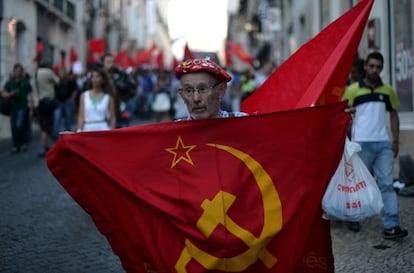Red revival: why communism is alive and well in crisis-hit Portugal
As it flags elsewhere in Europe, Communist Party gains ground in local elections


Carlos Humberto de Carvalho, the mayor of Barreiro, is a straightforward and frank 62-year-old who has just won the Portuguese city’s municipal elections for the third time in a row — and with an absolute majority. Dressed without a tie, he has been a communist since he came of age in 1968, since the tough, tricky and far-off days of the underground era. He belongs to the hardcore — to the Central Committee of the Portuguese Communist Party (PCP) — and he constitutes an example of a rare phenomenon in European politics nowadays: the successful survival of a party that is floundering or dying in neighboring countries, but in Portugal is both enduring and accepted in society.
At recent local elections on September 29, where abstentions stood at a record 47 percent, the CDU — an alliance between the PCP and the Greens, in which the Communists carry much more weight — was, along with the independent candidates, the only political group that gained ground. It earned over 10 percent of the vote (11.1 percent), winning the mayor’s office in 34 municipal governments, six more than four years ago. Ahead of it lie only the Portuguese Socialist Party (PS) with 148 mayoralties and the conservative PSD of Prime Minister Pedro Passos Coelho, with 86.
Portugal’s communist bastions lie in the rural Alentejo region and in Lisbon’s industrial belt, on the southern bank of the Tagus. Barreiro lies in the latter, a working-class area, born out of industry and with an above-average unemployment rate, which currently runs around 17 percent. Mayor Humberto de Carvalho says the PCP’s continuing success in the city of 80,000 comes down to a matter of trust: “Because we say what we do and we do what we say,” he says. “Here you don’t say one thing and do another. People like consistency.”
We say what we do and we do what we say,” says one communist mayor
He admits that, as in towns across Portugal, they have had to cut back in the last four years, including on garbage-collection services and local bus routes. But he says he has given local residents the chance to have their say on the new bus routes in assemblies. “It was difficult. One woman asked me why we were taking away the stop on her street if she was paying as much in taxes as her neighbor, who had one below her house that remained. I can’t force all the residents to understand. But I am obliged to explain it to everyone,” he says.
But if there have been cuts, what differentiates his management from that of the central government? “Well, we would never privatize anything. And we would never throw a public worker out on the street,” he replies, adding: “There will always be resources to open school cafeterias during the holidays so that children from families on lower incomes can eat.”
Experts say that the PCP has known how to attract the punishment vote of a population fed up with seeing their quality of life worsen on a daily basis. Political scientist António Costa Pinto says you have to look for the reasons behind the PCP’s rude political health in its establishment at the local level; in how it has been capable of capitalizing on a certain Euro-skepticism; in the inability of the Socialists — more to the center than their Spanish counterparts — to scrape together support for the left; and in its strong roots in labor unions. “Portuguese communism knew how to survive the Cold War well,” he explains. “Paradoxically, in the hands of its long-serving leader Álvaro Cunhal, it never modernized nor adhered to Eurocommunism. It stayed faithful to itself through the ideological storm that tore across the planet. And now, the other European communist parties have almost disappeared, while the old Portuguese Communist Party is still alive.”
Tu suscripción se está usando en otro dispositivo
¿Quieres añadir otro usuario a tu suscripción?
Si continúas leyendo en este dispositivo, no se podrá leer en el otro.
FlechaTu suscripción se está usando en otro dispositivo y solo puedes acceder a EL PAÍS desde un dispositivo a la vez.
Si quieres compartir tu cuenta, cambia tu suscripción a la modalidad Premium, así podrás añadir otro usuario. Cada uno accederá con su propia cuenta de email, lo que os permitirá personalizar vuestra experiencia en EL PAÍS.
¿Tienes una suscripción de empresa? Accede aquí para contratar más cuentas.
En el caso de no saber quién está usando tu cuenta, te recomendamos cambiar tu contraseña aquí.
Si decides continuar compartiendo tu cuenta, este mensaje se mostrará en tu dispositivo y en el de la otra persona que está usando tu cuenta de forma indefinida, afectando a tu experiencia de lectura. Puedes consultar aquí los términos y condiciones de la suscripción digital.








































